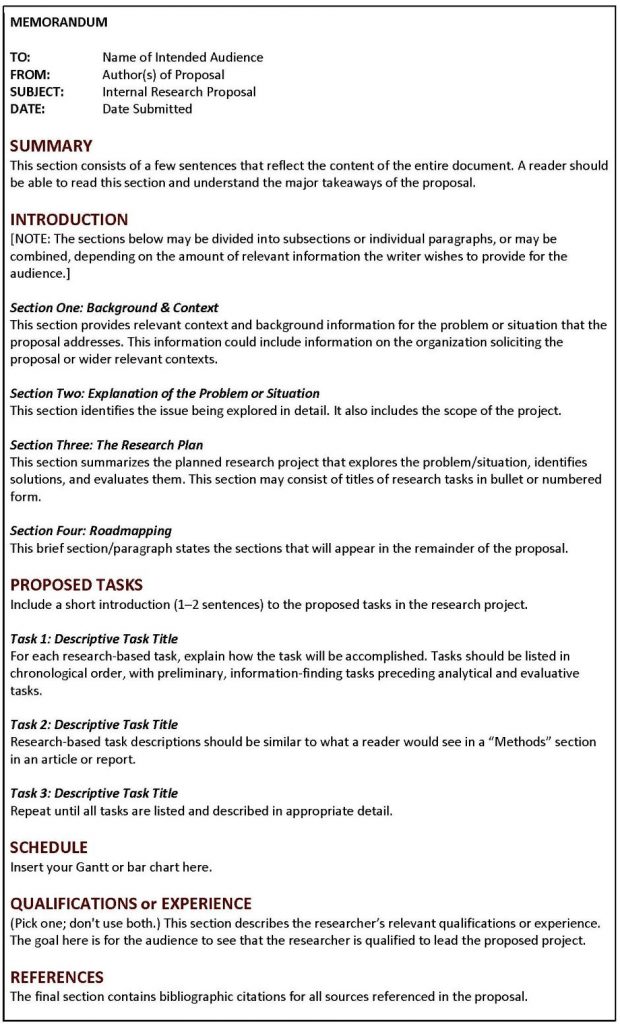18 – Proposals
Proposals in ENGL 210
Suzan Last; David McMurrey; Annemarie Hamlin; Chris Rubio; Michele DeSilva; Nicole Hagstrom-Schmidt; and Matt McKinney
Proposals written as an assignment in Technical Writing classes generally do the following:
Address the defined audience, not the instructor. Although you are writing a proposal to be graded in a class, you will want to follow regular proposal guidelines as closely as possible. This includes directing your proposal to the real audience.
Identify and define the problem that needs to be solved or the opportunity that can be taken advantage of. You must show that you clearly understand the problem/situation if you are to convince the reader that you can solve it. Part of understanding the problem is understanding the audience. If your proposal does not clearly indicate how the audience will be impacted, then your proposal will likely be rejected.
Describe your proposed project, clearly defining the scope of what you propose to do. Often, it is best to give a general overview of your idea and then break it down into more detailed sub-sections. Strong proposals often include information on how the project will be conducted, similar to a Methods or Methodology section of a report or study.
Indicate how your proposed research will give you enough information to solve the problem and eventually provide a clear recommendation. Specifically, indicate how your project will meet the objectives and abide by the constraints outlined in the problem definition. Give specific examples. Be as empirical as possible, but appeal to all appropriate persuasive strategies. Emphasize anticipated results, benefits, and feasibility of your proposed research.
Propose a timeline for completing your project. This timeline should be represented graphically in the form of a Gantt chart or timeline. It should include the major milestones or deliverables of the project, as well as dates or timeframes for completion of each step.
Describe your qualifications to take on and/or lead this project. In a Qualifications section, you persuade the reader that you have the required skills, experience, and expertise to complete this job. When composing a Qualifications section, consider education, research, work, volunteer, and extracurricular experiences. Depending on your audience (such as a religious community or workplace), you may also appeal to your shared mutual interests and membership in the community.
Use a pure summary in your memo that identifies the problem, describes what you will do in each task and why, and specifies your qualifications. Do not simply provide a metacommentary in your Summary section (for example, don’t write, “This memo will discuss the proposed tasks for this project and specify my qualifications for completing them”). Instead, provide details.
Remember that a Summary is sometimes used as an abbreviated stand-in for the full memo, so simply pointing your audience to the main body of the memo is not helpful. Also keep in mind that an executive summary typically emphasizes results and recommendations, so this summary type may not be a good fit for a project that hasn’t begun yet.
Figure 18.3 [1] below offers a template for structuring a proposal using the traditional memo format. Notice that the template utilizes different levels of headings to organize and draw attention to important information in the proposal. This structuring allows for a reader (who may be reading through several competing proposals) to quickly scan for the necessary information.

This text was derived from
Last, Suzan, with contributors Candice Neveu and Monika Smith. Technical Writing Essentials: Introduction to Professional Communications in Technical Fields. Victoria, BC: University of Victoria, 2019. https://pressbooks.bccampus.ca/technicalwriting/. Licensed under a Creative Commons Attribution 4.0 International License.
Gross, Allison, Annemarie Hamlin, Billy Merck, Chris Rubio, Jodi Naas, Megan Savage, and Michele DeSilva. Technical Writing. Open Oregon Educational Materials, n.d. https://openoregon.pressbooks.pub/technicalwriting/. Licensed under a Creative Commons Attribution-NonCommercial-ShareAlike 4.0 International License.
McMurrey, David. Online Technical Writing. n.d. https://www.prismnet.com/~hcexres/textbook/. Licensed under a Creative Commons Attribution 4.0 International License.
- Nicole Hagstrom-Schmidt and Kalani Pattison, “210 Proposal Template,” 2021. Licensed under a Creative Commons Attribution-NonCommercial-ShareAlike 4.0 International License. ↵
